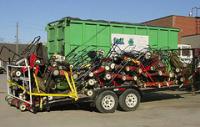The folks at the Clean Air Foundation recently announced this year’s version of Mow Down Pollution. It’s a campaign, started in 2001, that encourages Canadians to turn in their old and busted lawn mowers. When I first heard about this project I was, like, really? Lawnmowers are big polluters? As it turns out, they matter:
- A gas mower can emit the same amount of air pollutants in one hour as driving a new car for over 550km.
- Statistics Canada reports that gas-powered lawn equipment releases about 80,000 tonnes of emissions in Canada every year, using 151 million litres of gas.
Over the past seven years, CAF has collected over 18,000 gas-powered and trimmers, eliminating 406 tonnes of greenhouse gas and smog-forming emissions.
Got an old junker that you want to turn in? You can do so at any Home Depot across the country from April 17 to 27, 2008. They’ll even give you a rebate on a new push, electric, rechargeable or low emission mower. Get a push mower–you could probably use the exercise.
Subscribe to our newsletter
Stay up to date with DeSmog news and alerts







